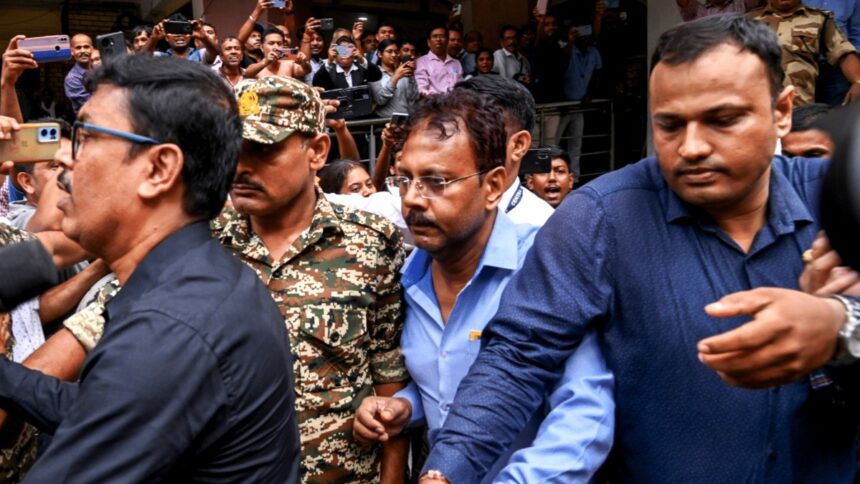Former principal of RG Kar Medical College and Hospital, Sandip Ghosh, has escalated his legal battle to the Supreme Court. He is contesting a decision by the Calcutta High Court that mandated a Central Bureau of Investigation (CBI) probe into allegations of financial misconduct during his tenure. This development comes amidst intense scrutiny surrounding Ghosh due to a high-profile case involving the rape and murder of a trainee doctor at the institution.
Background of the Case
On August 9, a grave incident shocked the medical community: a 31-year-old trainee doctor was found raped and murdered in the seminar hall of RG Kar Medical College. This tragedy led to widespread outrage and demands for accountability. Sandip Ghosh, who was the principal of the college at the time, faced intense scrutiny as the investigation unfolded.
In the wake of this incident, Ghosh resigned from his position on August 12. However, he was promptly appointed as the principal of Calcutta National Medical College. The Calcutta High Court intervened, instructing him to go on a long leave and barring him from taking up the new position.
Corruption Allegations and CBI Investigation
Parallel to the murder investigation, allegations of financial irregularities during Ghosh’s tenure surfaced. These accusations prompted Dr. Akhtar Ali, a former deputy superintendent at RG Kar, to petition for an investigation. On August 23, the Calcutta High Court ordered the transfer of the corruption probe from a special investigation team to the CBI, citing the need for a more thorough investigation.
On August 26, the CBI detained Ghosh and three other people: security guard Afsar Ali, merchants Biplav Singha and Suman Hazara, and vendors Biplav Singha. Section 120B of the Indian Penal Code, Section 420 of the Act on Cheating, and Section 120B of the Prevention of Corruption Act, 1988 are among the laws under which Ghosh has been accused by the CBI.
Legal Challenge in Supreme Court
Now that the inquiry has been turned over to the CBI by the Calcutta High Court, Ghosh has carried his struggle all the way to the Supreme Court. His appeal contends that the High Court should have given him a chance to explain himself before directing the transfer, and it is scheduled to be heard on September 6. Sandip Ghosh claims that the denial of his request to be included as a party in the proceedings undermines the fundamental ideas of natural justice.
Additionally, Sandip Ghosh seeks to have certain remarks made by the High Court expunged. He argues that linking the corruption allegations with the rape and murder case has prejudiced the public perception of his involvement.
Current Status and Developments
The recent developments have been swift. Sandip Ghosh and the other three detained persons were given eight days of detention by the CBI by a Kolkata court on September 3. In their initial request, the CBI stated that they need 10 days to locate a “large nexus” of corruption.
In a related action, the state health department suspended Ghosh from his position, effective immediately, under the West Bengal Services (Classification, Control and Appeal) Rules of 1971. The seriousness of the current investigations and the requirement for responsibility are highlighted by this suspension.
Public and Legal Reactions
The case has attracted a lot of legal and popular interest. A lot of people will be watching the Supreme Court’s next hearing since it will decide the next steps for the corruption investigation and Ghosh’s claims. The focus remains on the intertwining issues of corruption and the high-profile crime that has captured public interest.
Now officially, Sandip Ghosh is suspended by swasthya Bhawan, Kolkata. #MedTwitter #justiceforabhya pic.twitter.com/zy80dQeUJL
— Indian Doctor🇮🇳 (@Indian__doctor) September 3, 2024As Sandip Ghosh challenges the Calcutta High Court’s decision in the Supreme Court, the dual investigations into financial misconduct and the horrific murder continue to unfold. The legal proceedings will likely have far-reaching implications for all parties involved and could set important precedents for handling high-profile cases of corruption and criminal misconduct.
For more updates on this case and other related news, stay tuned to our coverage.
Read More: Mamata Banerjee’s Aparajita Bill: A New Law for Death Penalty in Rape Cases






